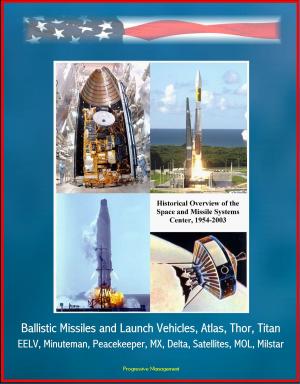Military Modernization and the Russian Ground Forces, Prospects for U.S.-Russian Security Cooperation: Putin, Russian-Georgia War, Arms Control, Ukraine, Post-Cold War Era
Nonfiction, History, Asian, Russia| Author: | Progressive Management | ISBN: | 9781310702983 |
| Publisher: | Progressive Management | Publication: | March 20, 2014 |
| Imprint: | Smashwords Edition | Language: | English |
| Author: | Progressive Management |
| ISBN: | 9781310702983 |
| Publisher: | Progressive Management |
| Publication: | March 20, 2014 |
| Imprint: | Smashwords Edition |
| Language: | English |
Two important reports from the Army Strategic Studies Institute examine the Russian military and Russian-American cooperation.
Military Modernization and the Russian Ground Forces - Military organizations have to change with the times. But organizations, of course, resist change; military organizations resist change more than most; and, it can be argued, Russian military organizations resist change more than most military organizations. This is clear from the pace of the post-Cold War attempts to reform the Russian ground forces. Historically, this was an army that, in many ways, sacrificed the need for military efficiency in order to perform a role as the inculcator of Soviet values into young conscripts. Social engineering then mattered almost more than military skill. But today, in the era of high-tech weaponry and expeditionary warfare, armies all across the world can no longer remain simply as 2-year repositories for unmotivated conscript soldiers. Thus it has long been recognized in Moscow's political circles that the "citizen-army" must be replaced by modern, flexible, and well-trained ground forces. The Russian leadership believes that such forces would better protect the country and serve the government as an adjunct to its foreign and security policy. Indeed, it is the likes of President Vladimir Putin and Prime Minister Dimitry Medvedev who have been the main instigators of reform — wanting their armed forces to be more capable operationally. The politicians have been facing the resistance of conservative generals, and for several years there has been stalemate in the reform process. However, the war with Georgia in 2008 showed the overall weaknesses of the Russian military, and thus undermined the opposition of the generals. Significant change could now come. The Russian ground forces are therefore now undergoing quite significant reform in terms of structure, deploy-ability, and overall philosophy. U.S. military planners must be mindful that, if all that is anticipated comes to pass, these Russian ground forces are now set to shake off many of their old Soviet failings and deficiencies.
Prospects for U.S.-Russian Security Cooperation - Many might argue that this is a singularly inauspicious time to assess the prospects for U.S.-Russian security cooperation. Arguably, the prospects for bilateral cooperation lay buried under the wheels of Russia's invasion of Georgia in August 2008. As Vice-President Richard Cheney has said to Georgian President Mikhail Saakashvili, "Russian aggression must not go unanswered," and that "its continuation would have serious consequences for its relations with the United States." Undoubtedly this invasion will have repercussions across the broad bilateral agenda, most of all insofar as regional security in the Caucasus is concerned. But ultimately, given their power, standing, and nuclear capability, dialogue and cooperation will be resumed at some point in the future. Therefore, an analysis of the prospects for and conditions favoring such cooperation is an urgent and important task that cries out for clarification precisely because current U.S.-Russian relations are so difficult. Prospects for U.S.-Russian Security Cooperation - Foreword * 1. Introduction * 2. Presidential Elections and the Future of U.S.-Russian Relations: A Time for Reflection * 3. Arms Control and U.S.-Russian Relations * 4. Arms Control and U.S.-Russian Relations * 5. Terms of Engagement: Weapons of Mass Destruction Proliferation and U.S.-Russian Relations * 6. Prospects for Russo-American Cooperation in Halting Nuclear Proliferation * 7. Russian and American Strategic Rivalry in Ukraine and Georgia * 8. Obstacles to U.S.-Russian Cooperation in the Caucasus and Ukraine
Two important reports from the Army Strategic Studies Institute examine the Russian military and Russian-American cooperation.
Military Modernization and the Russian Ground Forces - Military organizations have to change with the times. But organizations, of course, resist change; military organizations resist change more than most; and, it can be argued, Russian military organizations resist change more than most military organizations. This is clear from the pace of the post-Cold War attempts to reform the Russian ground forces. Historically, this was an army that, in many ways, sacrificed the need for military efficiency in order to perform a role as the inculcator of Soviet values into young conscripts. Social engineering then mattered almost more than military skill. But today, in the era of high-tech weaponry and expeditionary warfare, armies all across the world can no longer remain simply as 2-year repositories for unmotivated conscript soldiers. Thus it has long been recognized in Moscow's political circles that the "citizen-army" must be replaced by modern, flexible, and well-trained ground forces. The Russian leadership believes that such forces would better protect the country and serve the government as an adjunct to its foreign and security policy. Indeed, it is the likes of President Vladimir Putin and Prime Minister Dimitry Medvedev who have been the main instigators of reform — wanting their armed forces to be more capable operationally. The politicians have been facing the resistance of conservative generals, and for several years there has been stalemate in the reform process. However, the war with Georgia in 2008 showed the overall weaknesses of the Russian military, and thus undermined the opposition of the generals. Significant change could now come. The Russian ground forces are therefore now undergoing quite significant reform in terms of structure, deploy-ability, and overall philosophy. U.S. military planners must be mindful that, if all that is anticipated comes to pass, these Russian ground forces are now set to shake off many of their old Soviet failings and deficiencies.
Prospects for U.S.-Russian Security Cooperation - Many might argue that this is a singularly inauspicious time to assess the prospects for U.S.-Russian security cooperation. Arguably, the prospects for bilateral cooperation lay buried under the wheels of Russia's invasion of Georgia in August 2008. As Vice-President Richard Cheney has said to Georgian President Mikhail Saakashvili, "Russian aggression must not go unanswered," and that "its continuation would have serious consequences for its relations with the United States." Undoubtedly this invasion will have repercussions across the broad bilateral agenda, most of all insofar as regional security in the Caucasus is concerned. But ultimately, given their power, standing, and nuclear capability, dialogue and cooperation will be resumed at some point in the future. Therefore, an analysis of the prospects for and conditions favoring such cooperation is an urgent and important task that cries out for clarification precisely because current U.S.-Russian relations are so difficult. Prospects for U.S.-Russian Security Cooperation - Foreword * 1. Introduction * 2. Presidential Elections and the Future of U.S.-Russian Relations: A Time for Reflection * 3. Arms Control and U.S.-Russian Relations * 4. Arms Control and U.S.-Russian Relations * 5. Terms of Engagement: Weapons of Mass Destruction Proliferation and U.S.-Russian Relations * 6. Prospects for Russo-American Cooperation in Halting Nuclear Proliferation * 7. Russian and American Strategic Rivalry in Ukraine and Georgia * 8. Obstacles to U.S.-Russian Cooperation in the Caucasus and Ukraine















